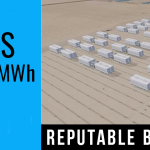
Yulong Ding, director of the University of Birmingham’s Centre for Energy Storage, UK, explains how Chinese companies are keen to work with international teams to develop new technologies.
What led you to focus on energy storage?
My research on energy storage started approximately 20 years ago. Back then, China was playing catch-up in this field. But in the past decade, the country’s expertise has drawn roughly parallel with that of Europe and the United States.
I came to the United Kingdom in 1994 to do my PhD in chemical engineering at the University of Birmingham, after finishing my undergraduate and master’s degrees in thermal energy engineering at the University of Science and Technology, Beijing. I went on to complete six years of teaching and research there.
How has energy-storage research in China developed in recent decades?
My collaborations with China are mainly in thermal and liquid air energy storage. My team has several postdocs and PhD students from China, and we regularly have Chinese professors visiting. I think there will be fewer international students over the next few years because tuition fees have increased; to study here costs close to £30,000 (US$39,200) per year now, and many postdocs want to start their careers in China because they can find better-paid positions there, and the research quality has increased.
Although China leads the world in its capacity to produce solar and wind energy, roughly two-thirds of China’s electricity is generated by coal. So it has real clean-energy challenges.
What projects are you currently working on with teams in China?
In 2016, our centre established a joint energy-storage research laboratory with the Beijing-based State Grid Corporation of China, which operates the country’s electricity network. We now have six completed research projects related to energy conversion and storage. A seventh, secured during lockdown, is in progress. For example, we are developing materials for use in energy storage that change from solid to liquid, and back again, to release power.





